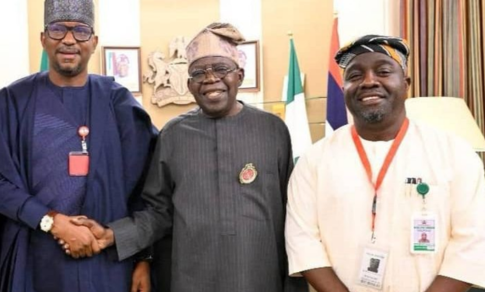The National Sports Commission (NSC) has unveiled the Renewed Hope Initiative for Nigeria’s Sports Economy (RHINSE), a bold plan to transform the nation’s sports industry through the Reset, Refocus, and Relaunch (RRR) initiative, which aims to shift Nigeria’s sports ecosystem from a competition-driven model to a development-driven and value-adding industry.
The strategy brief, signed by NSC Chairman Mallam Shehu Dikko, is designed as a framework to establish sports as a vital driver of Nigeria's socio-economic growth and development.
Led by Mallam Shehu Dikko as Chairman and Bukola Olopade as Director General, the NSC has set an ambitious objective and roadmap to unlock the potential of the sports economy by revitalizing infrastructure, fostering grassroots development through school sports and professional academy programs, and promoting private sector engagement and investment in sports, as well as ensuring sustainable and credible participation across all competitions.
Dikko expressed the Federal Government’s commitment to elevating sports, stating, “This is a defining moment for the sports industry in Nigeria. The RHINSE initiative is not just about investing in infrastructure, but about redefining sports as a national asset, thus deserving all the requisite support, concessions, and legal frameworks to drive growth. It is a tool for unity, cultural promotion, and economic growth, with the potential to uplift millions of our youth and communities across the country.”
In the Federal Government of Nigeria's 2025 budget, presented by President Bola Ahmed Tinubu to the National Assembly on December 18, 2024, an unprecedented and deliberate capital proposal of over ₦78 billion has been made for sports with the sole objective of advancing and jumpstarting the sports economy.
“This specific capital budget will fund critical infrastructure and programs, including sports infrastructure development, and the establishment of an Anti-Doping Laboratory, which is expected to generate substantial revenue in foreign exchange. Other provisions have been included to accelerate the advancement of sports in alignment with the RHINSE objectives.”
Mallam Shehu Dikko added that the RHINSE initiative is anchored on institutional repositioning, the restructuring of sports federations, grassroots development, and private sector collaboration to foster growth.
“As part of its efforts, the NSC is focusing on developing and upgrading key sporting facilities across the country to meet global standards,” Dikko explained.
He further stated, “The projected outcome from the implementation of the RHINSE program is to position sports as a key component of Nigeria's economy and social fabric, contributing at least 3 percent of GDP, creating and sustaining at least 3 million jobs across the sports value chain (direct, indirect, and induced sports jobs), dominating the global sports talent export market, earning foreign exchange into the country, reinvesting in the system, enabling private sector participation and investment to complement government efforts, ensuring credible participation across all international competitions, providing infrastructure to advance professional sustainable development, and hosting international tournaments and competitions, thus creating social impact.”
Furthermore, the Commission's DG, Olopade, further emphasized the transformative potential of the initiative, adding, “RHINSE is a game-changer for sports development in Nigeria. It’s a deliberate and focused strategy that will not only set the foundation and roadmap for enhancing sports development in Nigeria, but also create opportunities for our youth to thrive and for the country to attract global recognition and investment in the sports economy.”
With the RHINSE initiative, the NSC underscores its commitment to leveraging sports as a unifying force, a source of economic empowerment, and a platform for showcasing Nigeria’s talent and cultural heritage on a global stage.
“Nigeria is on the cusp of a significant step in resetting, refocusing, and relaunching Nigeria’s sports ecosystem for sustained growth and development,” Dikko concluded.








ADD A COMMENT :